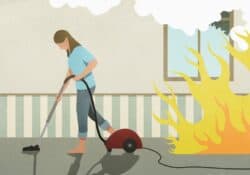Handling all fires (Picture: Getty)
You might not know the term ‘kinkeeping’ – but you’ll have likely benefitted from it at some point in your life.
With the magic of Christmas now behind us, many might be feeling rested, but mums and head female figures in families certainly won’t.
It’s a well known reality that mums are often responsible for making Christmas run smoothly – doing the shopping, cooking, wrapping and organising.
But even though this period is now over, we can’t forget that kinkeeping is still continuing in family set ups.
It’s the invisible work women do all of the time that often goes without credit or thanks, and is just expected.
Kinkeeping is the unpaid labour women are assigned subconsciously due to their gender.
The coined was termed in the mid-1980s and every study done on the subject has shown that women shoulder the burden of kinkeeping much more than men.
Psychologist Dawn Braithwaite, described kinkeepers as ‘family members who help enable and assist family communication, plan family gatherings, and help the family keep in touch.’
The first study in 1996 revealed that 85% were women – mostly mothers, aunts and grandmothers, between the ages of 40 and 59. And, as they aged, the role was passed down to younger family members. Researchers say that, to this day, they are still mostly women.
A content creator on TikTok who goes by Advice Girl shared her insight on kinkeeping and it’s resonated with many viewers. So far, the video has been viewed more than 4 million times.
Having learned about this in a women’s studies class, she says: ‘Kinkeeping is the root of stress in most women’s lives.
‘And because they don’t know the name for it, they’re often called irrational.’
She then goes on to give an analogy of going to the theatre and watching a play. At the end, the audience claps for the actors.
However, plenty of behind the scenes staff have also made the show happen, and their job is to not be seen.
This is similar to family dynamics, in which women take on the burden of housework and chores – only in this scenario, people only see and value the final clean house, not the labour put into making it that way.
It also applies to emotional labour, as women are often given an unfair share of that too in romantic and familial relationships.
All of this requires ‘time and energy’, as she explains.
Kinkeeping involves ‘performing convenience for everyone, to put on a show.’
She adds: ‘It’s not only your mom, it’s your aunts, your grandma.’
By comparison, men are often relaxing not knowing when things such as dinner will be ready.
Another example is on a holiday. She says: ‘Your mom’s wondering: did everything get packed? Where is everybody? Has everyone eaten? What time are we getting there? When are we supposed to get there?
‘You might notice your dad saying “Calm down, why are you being so irrational? Everything’s going to be fine. Stop worrying so much.”
‘This man doesn’t see all the work your mother has done, because it doesn’t have a name.’
As a result, it creates ignorance in men, from not knowing the size of their children’s clothes to how to cook a simple dinner.
It’s worth noting that when men are the one’s doing the kinkeeping, they often aren’t doing it as invisibly as women.
Think about the number of times a dad is praised for doing the school run, or seen as special, when mums do it every day.
How we fix this, isn’t an easy step-by-step, but talking about it and enlightening men about the kinkeeping women do is a good start.
The better understood this is, the more likely everyone will balance the weight of kinkeeping.
Do you have a story to share?
Get in touch by emailing [email protected].
MORE : Woman who learned she was born with two vaginas at 21 says it made her feel ‘like an alien’
The term ‘kinkeeping’ is gaining attention on Tiktok – but what does it mean?





